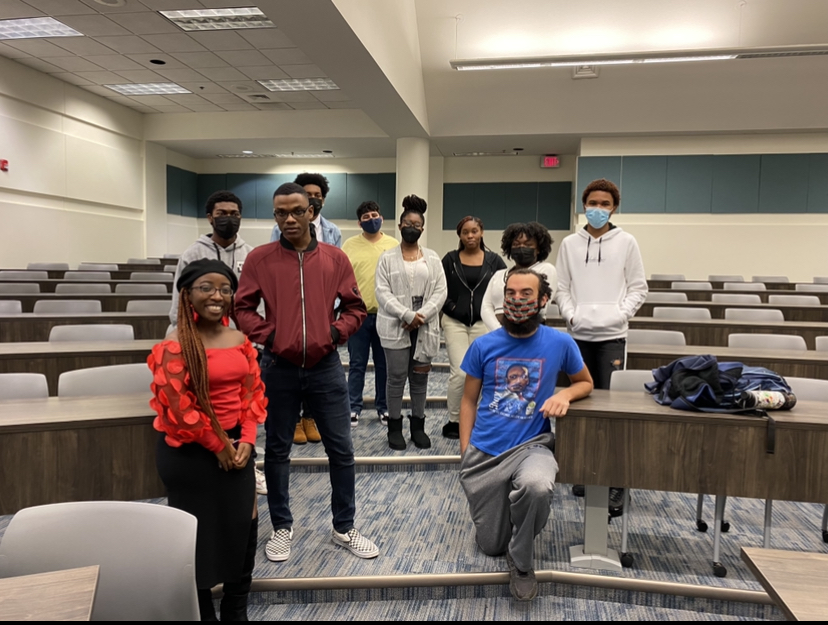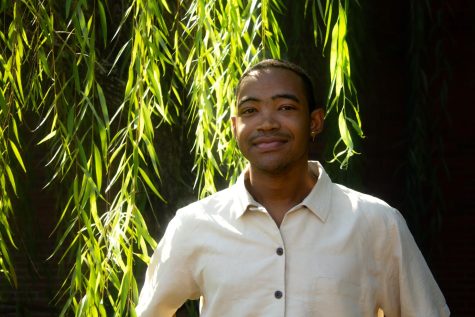The Great Debate: Is the Electoral College Still Relevant?
Some participants of The Great Debate.
On Wednesday, February 9th the Georgia Southern NAACP Chapter at Armstrong held a debate regarding the Electoral College.
The room was split. On one end sat a group who very strongly felt that the Electoral College was no longer relevant. At the other side of the room, arguments were made for its reliability.
Those who called for a restructuring of the voting system pointed out that the Electoral College does not always consider the popular opinions of the public. Members of the EC do not always reflect the diverse demographics or interests of the state they represent.
One participant referenced Alexandra Ocasio-Cortez’s stance on the matter. In 2019, the representative took to Twitter, stating that the EC’s power shouldn’t be greater than the people’s opinion. “The EC makes it so a handful of states DO determine elections.”
Another participant in favor of the EC agreed that steps could be taken to rework our current voting system, but held strongly on the belief that popular opinion shouldn’t be the only deciding factor in America. Furthermore, a lack of voting and candidate literacy could greatly impact the numbers.
The moderator of the event, Bryce Bermudez, is a Sophomore Writing and Linguistics major. Bermudez is also the Parliamentarian of the NAACP Chapter at Armstrong Campus. “I think that we often criticize specific politicians or specific parties but we don’t criticize our systems that much,” he told me. “If you look at if from a voters perspective, it’s like ‘why would I vote if I’m not being represented anyway?’’’
The group has no plans for future debates, but Bermudez is open to the idea. “It’s definitely helpful, getting people together, to care about it, to research it,” he told me. “So I think we could do it again. But as of now, no plans.”
Students may visit @Armstrong_NAACP on Instagram for more information on upcoming NAACP events.





Susan Anthony • Feb 22, 2022 at 3:16 pm
In 1970, 3 Southern segregationist Senators used the filibuster to kill changing to requiring winning the national popular vote to become President.
To counter the antidemocratic impulse behind voter suppression, election subversion, and January 6, we need to guarantee the candidate who wins the most national popular votes wins the presidency.
Every vote in every state would matter and count equally as 1 vote in the national total.
State legislators in states with 75 more electoral votes are needed to enact the National Popular Vote bill.
We also need to support professional election officials and candidates and lawmakers who support voting rights and respect election results.
“Having won the long and difficult and dangerous struggle to win the right to vote, we cannot now accept the proposition that any one person’s vote can count more than another. I respectfully submit that the direct popular election of the President is an idea whose time has not only come, but is long overdue.” – U.S. Rep. John Lewis
“The suppression of Black votes is white supremacist violence.” – Bush
4 out of 5 voters of color have lived in non-battleground states.
Because of current state-by-state statewide winner-take-all laws for Electoral College votes, not mentioned, much less endorsed, in the Constitution . . .
Only the few states where support for the two parties is almost equally divided are important.
“Racial minorities, particularly Latinos and Asian Americans, disproportionately live in states that are ignored in presidential elections due to winner-take-all rules for allocating electoral college votes.”—FairVote
In the current system, battleground states are the only states that matter in presidential elections. Campaigns are tailored to address the issues that matter to voters in these states.
Safe red-winning and blue-winning states are considered a waste of time, money and energy to candidates. These “spectator” states receive no campaign attention, polling, organizing, visits, or ads. Their concerns are utterly ignored.
“In the South right now, millions and millions of votes by black citizens basically don’t count for anything, because white citizens in that state are enough of a majority to always … win all of the electors in those states. So black voters in the South who vote for Democrats — which means virtually all blacks right now — are essentially invisible in every presidential election. So you see these patterns replicating themselves throughout our history. The people who stopped the popular vote amendment in the late 1960s were Southern segregationists. Some of the people who prevented us from getting to a popular vote in the founding of the country were slave holders. Again and again, the pattern repeats itself.” – Wegman, 3/18/20
The influence of ethnic minority voters has decreased tremendously as the number of battleground states dwindles. For example, in 1976, 73% of blacks lived in battleground states. In 2004, that proportion fell to a mere 17%. Just 21% of African Americans and 18% of Latinos lived in the 12 closest battleground states. So, roughly 80% of non-white voters might as well have not existed when there were 12 battleground states..
In 2000, 58 percent of African-Americans lived in former slave states, where 100 percent of the electoral college votes went to Republican George W. Bush, even though 90 percent of their votes went for Democrat Al Gore. Thus, more than 20 million African-Americans in those states could not produce one elector for Gore, yet 148,000 mostly white voters in Wyoming gave Bush three electors.
The National Popular Vote bill has been endorsed by organizations such as the League of Women Voters, Common Cause, FairVote, Sierra Club, NAACP, National Black Caucus of State Legislators, ACLU, the National Latino Congreso, Asian American Action Fund, DEMOS, National Coalition on Black Civic Participation, Public Citizen, U.S. PIRG, and the Brennan Center for Justice.
Eric Holder, Michael Steele, and Ben Jealous are on the Advisory Board of National Popular Vote to make every vote in every state matter and count equally, and guarantee the presidency to the candidate who wins the most national popular votes.
The National Popular Vote bill is states with 270+ electoral votes agreeing to award their electoral votes to the winner of the most national popular votes, by simply changing their state’s law.
All votes would be valued equally in presidential elections, no matter where voters live.
The sheer magnitude of the national popular vote number, compared to individual state vote totals, is much more robust against “pure insanity,” deception, and manipulation.
Before states began enacting voter suppression and election subversion laws, the system with 2020 election laws meant that the winning 2024 candidate “may need a national popular vote win of 5 percentage points or more in order to squeak out an electoral college victory. Only once has the margin of popular vote victory been that large since Bill Clinton’s re-election,” Jacob Long
“If Republicans are building the infrastructure to subvert an election — to make it possible to overturn results or keep Democrats from claiming electoral votes — then we have to expect that given a chance, they’ll use it.” – Jamelle Bouie
When presidential candidates, who more Americans vote for, lose the Electoral College, the situation is unsustainable. This is how a government loses its legitimacy.
NationalPopularVote.com
brennancenter.org/our-work/research-reports/election-sabotage-scheme-and-how-congress-can-stop-it